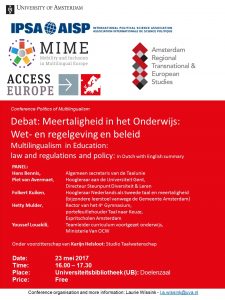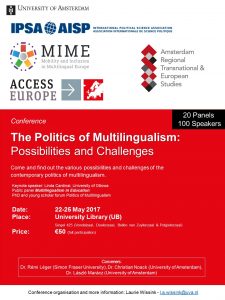Dear All, because of the current situation activities of our network are suspended. Thank you for your understanding. Best regards, Federico Gobbo
Meertaligheid in het Amsterdamse onderwijs: Van voorschool tot universiteit
Deze zomer wordt het Europese project Mobility and Inclusion in a Multilingual Europe (MIME) afgerond. Een consortium van 22 wetenschappelijke teams afkomstig uit 16 lidstaten van de EU heeft dit programma-onderzoek uitgevoerd, met financiering van het Zevende kaderprogramma voor onderzoek (KP7) van de Europese Unie. De resultaten worden gepresenteerd in een Vademecum, dat op 27 juni feestelijk wordt gepresenteerd in Amsterdam.
Het Vademecum wordt op 19 juni officieel aangeboden aan de Europese Commissie in Brussel. Bij de presentatie op 27 juni worden de bijdragen van de twee teams van de UvA – van het Amsterdam School for Regional, Transnational and European Studies (ARTES) en het Amsterdam Institute for Social Science Research (AISSR) – uitgelicht.
Vragen? Download PDF
Contested Languages in the Old World conference to be held in Amsterdam
In May 2018 we will host the third edition of the CLOW series conferences, devoted to contestedness in European languages. Please check the official web site for more information.
Programme PhD and young scholar’s forum 24th of May
Public debate on multilingualism in education
The detail program of the conference on the Politics of Multilingualism is on line
For all people interested, the program of the conference on the Politics of Multilingualism is now available on line.
International Colloquium on “Language Skills for Economic and Social Inclusion”
FYI
International Colloquium on “Language Skills for Economic and Social Inclusion”
Humboldt-Universität zu Berlin, Germany
12-13 October 2017
https://www.projekte.hu-berlin.de/en/okonomie-und-sprache/conferences/upcoming?set_language=en
General goals
This conference aims at exploring the relationship between individual language skills and people’s integration in the economy and in society in general with a special focus on the labour market. Language skills can be viewed as human capital having a positive influence on people’s income, employability and social inclusion. This holds for immigrants, refugees and mobile people who can benefit from the knowledge of the official language(s) of the host country, but also for citizens learning foreign languages and using them in the workplace.
Background
Learning foreign or second languages has for a long time been associated with openness to other cultures. In recent decades, nevertheless, the discourse on language learning has gradually changed. Language skills are viewed as part of individuals’ human capital that can contribute to their economic welfare, increase productivity and foster growth. At the same time, language learning can promote social inclusion. As a result of recent massive migration flows to Europe both the Council of Europe and the EU have emphasised the importance of language skills for the economic and social integration of migrants and refugees.
There are some sound economic reasons behind these claims. Being a particular form of human capital, language skills may have a positive effect of the economic and social inclusion of individuals in different ways. Language skills in the official language of the host country may have a positive impact on immigrants’ income, measured in terms of earning differentials; foreign language skills may be associated with a higher employability, and with a lower probability of being dismissed when the costs of the workforce increase. Language skills, therefore, may facilitate the participation and the inclusion in the labour market, higher earnings and the possibilities of finding a job or holding it. Language skills can also promote a better inclusion in society. Employment, in fact, is one central aspect of inclusion.
Languages are necessary (although not sufficient) for social inclusion and cohesion. The Social Policy and Development Division of the United Nations defines Social inclusion as the process by which people resident in a given territory, regardless of their background, can achieve their full potential in life. This, of course, includes the economic life of individuals, without neglecting other social and political aspects. Social cohesion is a related concept that can be defined as a feature of a society in which all groups have a sense of belonging, participation, inclusion, recognition and legitimacy. This requires, among other things, avoiding the emergence of “parallel communities” that are divided (or even segregated) by language barriers within a given society.
Language policy can contribute to avoiding exclusion and segregation by promoting the linguistic integration of refugees and migrants, also in the labour market, and by fostering foreign language learning for mobile people who wish to spend a shorter or longer period of their lives abroad (e.g. international students). Language skills facilitate inclusion and cohesion because, among other things, they increase the capability of citizens and migrants to understand and communicate with the other members of society. It facilitates the access to (higher) education, which plays a key role in the development of an individual’s human capital.
Research questions
The number of potential research questions that are relevant for the conference is large. Here we present a non-exhaustive list that can help orienting prospective participants:
- Do language skills significantly contribute to the participation of individuals in the labour market?
- Which languages are more rewarded in the labour market and at which level of fluency? What differences among countries or regions can be observed in this respect?
- Do language skills improve international economic integration and trade?
- How does language competence affect the social inclusion of migrants and refugees? Which sociolinguistic barriers can hinder inclusion?
- Are language skills an important variable in employers’ recruiting decisions?
- Do some economic sectors make a more intensive use of language skills than other?
- What is the role of language policy in facilitating social inclusion and social cohesion?
- How do language education policies affect individuals’ migration decisions? Do foreign language skills significantly facilitate international labour mobility and therefore the economic integration of the European and the global labour market as a whole?
- What is the relationship between language skills in a lingua franca (e.g. English) and social integration in the host country where the lingua franca is not the locally dominant language? What differences can be found among low-skilled migrants and high-skilled (or “expats”) in this respect?
- Does a lingua franca increase social inclusion, or does it promote the emergence of separate networks of communication? What are the sociological implications of this?
Keynote speakers
The interdisciplinary nature of the conference is reflected by the variety of academic background of the invited keynote speakers
1. Economics
- Antonio Di Paolo: “The economic and social consequences of language-in-education policies” (AQR-IREA, Universitat de Barcelona, Spain)
- François Vaillancourt : “ Language policies and labour market earnings : plausible impacts and evidence from Québec ” (Université de Montréal, Canada)
- Ingo Isphording: “Immigrant language skills and labor market success” (IZA – Institute of Labor Economics, Germany)
2. Sociolinguistics
- Gabriele Iannàccaro: “Social inclusion and sociolinguistics” (Stockholms Universitet, Sweden)
- Sonja Novak: “Multilingualism at work: the case of firms in Slovenia” (Institute for Ethnic Studies, Ljubljana, Slovenia)
3. Sociology
- Amado Alarcón: “Measuring Occupational Language Skills” (Universitat Rovira i Virgili, Spain)
Date and Venue
12-13 October 2017
Humboldt-Universität zu Berlin,
Berlin, Germany
Fees and payment methods
The participation fee is €150 until 1 September and then €200. It includes four coffee breaks, two lunches and the social dinner on Thursday 12th October.
The participation fee for students of Humboldt-Universität is €50,-.
It is possible to pay either by bank transfer or by Paypal.
Submission and deadlines
The length of abstracts should not exceed 350 words. Abstracts must be submitted to the address “templito@hu-berlin.de” by 15 May 2017. The successful applicants will be notified by 30 June 2017.
Working languages
You can send abstracts in English, Esperanto, French, German, Italian, Spanish, or Swedish.
Local organisers
REAL – Research group on Economics and Language
Institut für Erziehungswissenschaft
Kultur-, Sozial- und Bildungswissenschaftliche Fakultät
Humboldt-Universität zu Berlin
Bengt-Arne Wickström
Jürgen Van Buer
Michele Gazzola
Torsten Templin
Wiwex GmbH
Scientific committee
Agresti, Giovanni (Università di Teramo, Italy)
Chiswick, Barry (George Washington University, USA)
De Schutter, Helder (University of Leuven, Netherlands)
Dunbar, Rob (University of Edinburgh, United Kingdom)
Dustmann, Christian (University College London, United Kingdom)
Gazzola, Michele (Humboldt-Universität zu Berlin, Germany)
Ginsburgh, Victor (ECARES, Université Libre de Bruxelles, Belgium)
Grenier, Gilles (Université d’Ottawa, Canada)
Marácz, Laszlo (Universiteit van Amsterdam, Netherlands)
Medda-Windischer, Roberta (European Academy of Bozen/Bolzano, Italy)
Shorten, Andrew (University of Limerick, Ireland)
Templin, Torsten (Humboldt-Universität zu Berlin, Germany)
Van Buer, Jürgen (Humboldt-Universität zu Berlin, Germany)
Von Busekist, Astrid (Sciences-Po, Paris, France)
Wickström, Bengt-Arne (Andrássy University Budapest, Hungary)
Wolf, Nikolaus (Humboldt-Universität zu Berlin, Germany)
With the kind support of
- Institute for Ethnic Studies, Ljubljana, Slovenia
- ILT project (CSO2015-64247-P) – Spanish Ministry of Economy and Competitiveness
- The MIME Project (www.mime-project.org)
Call for papers on Russia’s global language promotion
Call for papers
In collaboration with the International Political Science Organisation, ACCESS Europe, the Amsterdam School for Regional, Transnational and European Studies and the Migration and Inclusion in a Multilingual Europe (MIME) research group, the NEMESIS Jean Monnet Network is organising two panels at the conference “The Politics of Multilingualism” at the University of Amsterdam, 22-24 May 2017.
Both panels deal with
“Russia’s global language promotion: Between robust reassertion and soft securitisation”.
In the context of Russia’s current attempts at the economic and political re-integration of the post-Soviet space, geopolitical discourses stipulating Russia’s civilizational distinctiveness from the West play an important role. Russian culture and language, plus the latter’s historic role as a lingua franca in the region, are important arguments in such discourses. Since the mid-2000s, the Russian state channelled significant financial investment into the spread of Russian through language training and the dissemination of teaching materials.
Offering language courses and showcasing Russian culture is a legitimate cause, yet none of the new Russian organisations makes a secret of targeting their audience specifically in the ‘near abroad’ (the Russian term for the former Soviet republics) in the first place. In this area, the ascription of being a ‘Russian speaker’ has recently been instrumentalised to sustain Russian securitisation claims.
Outside the former Soviet space, Russian cultural institutions involved in the consolidation and
spread of the Russian language may in fact combine some of the functions of the former Soviet
‘friendship societies’ in cultural diplomacy. Against the backdrop of concerted Russian disinformation campaigns, the dissemination and sufficiently broad perception of Russian language media in countries of the former Soviet space or beyond (Germany, Israel) has more recently caused
considerable apprehension as well.
We invite papers examining the following questions:
Panel 1: The Russian Language as an Instrument in Russia’s Soft Power Toolbox”
– The role of Russian language in the definition of cultural or political affiliation with Russia, be it in the context of the “law on the compatriots”, in Russian Orthodox parishes abroad or among diaspora and migrant organisations.
– Programmes aiming at the consolidation or spread of Russian language use abroad, like the federal target program “Russian language” for 2016-2020;
– The institutional set-up of Russia’s support of Russian language use and education abroad, in
particular the activities of institutions like Rossotrudnichestvo or foundations like Russkii mir
in Russia’s “near abroad” and further afield.
Panel 2: Russia as a lingua franca and the use of Russian language media
– The legal status and the use of Russian among Russian speaking communities outside the Russian Federation, both within the “near abroad” and further afield (EU member states, Israel);
– Production, dissemination and monitoring of Russian language media (produced in Russia and abroad);
– The role of Russian language media in the mediascapes of countries with significant Russian speaking populations.
Deadline: Please send an abstract of up to 500 words and a short bio (max. 100 words) to
c.u.noack@uva.nl before 15 February 2017. Notification of acceptance will be issued at the end of
February 2017. Final workshop papers are due on 30 April 2017. As we are planning a publication of
the papers in a conference volume, all contributions should be original and not published elsewhere.
A conference fee of €50 covering lunches and a conference dinner applies for all participants at the conference “The Politics of Multilingualism”. Limited funding is available to cover accommodation and travel costs. Please indicate when submitting the abstract if you would like to apply for funding.
Conference organisers: Laszlo Márácz, Christian Noack (University of Amsterdam)
Call for Papers: The Politics of Multilingualism: Possibilities and Challenges
On 22-24 May 2017, the Amsterdam School for Transnational, Regional and European Studies of the Faculty of Humanities of the Universiteit van Amsterdam will host an international conference organized by ARTES (artes.uva.nl), ISPA’s RC50 (rc50.ipsa.org) and MIME (mime-project.org).
In recent years, global trends in migration, trade and overall mobility have continued to transform our objective realities and subjective experiences of linguistic diversity. More broadly, in many countries, the politics of multilingualism have raised new possibilities for collaboration and action as well as challenges to social solidarity and democratic life. In response, scholars in the broad field of language policy and planning have studied language policy choices, linguistic vitality and language revitalization, curriculum development and pedagogies, governing mechanisms and policy instruments, and explored the conditions for linguistic justice in complex societies.
This conference will provide an opportunity to examine and better understand these various possibilities and challenges associated with the contemporary politics of multilingualism. Proposals for individual papers or for panels are invited. We welcome case studies and comparisons, as well as papers adopting a theoretical or normative perspective. Established academics and early-career scholars are invited to submit proposals.
Our keynote speaker will be Dr. Linda Cardinal (University of Ottawa, Canada). Dr. Cardinal is Professor in the School of Political Studies and holder of the Chaire de recherche sur la francophonie canadienne et les politiques publiques at the University of Ottawa. She is one of Canada’s leading experts on language and politics, and her recent comparative work has focused on language regimes and state traditions. Dr. Cardinal is past president of IPSA’s RC50.
Proposals for papers should include full contact details (email address, mailing address, and affiliation) of the author(s) and an abstract of up to 250 words.
Panel proposals must include:
- A minimum of three papers and a maximum of four;
- Panel title and individual paper titles
- Short description of panel (up to 250 words)
- Contact details of chair, paper-givers and discussant
The final deadline for electronic submission of proposals is 20 January 2017. Notices of acceptance will be sent out no later than 15 February 2017. Proposals should be submitted to: l.k.maracz@uva.nl.
Conference registration will cost 50€ for all participants (paper-givers, discussants, chairs and attendees). Looking forward to seeing you in Amsterdam.
The organizers,
Dr. Rémi LÉGER (Simon Fraser University, rleger@sfu.ca)
Dr. László MARÁCZ (University of Amsterdam, l.k.maracz@uva.nl)
Dr. Christian NOACK (University of Amsterdam, c.a.noack@uva.nl)
Slides of the Expert Meeting on Multilingualism in Education are available
The slides of the talks presented in the expert meeting in March, 15, are now available here:


